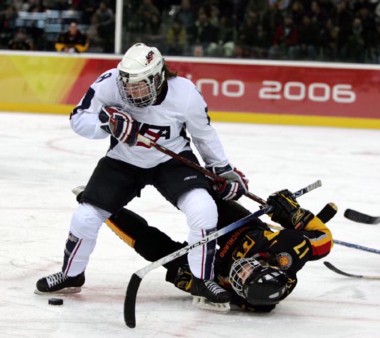The Olympics are never political. Except when they are.
The question of what, if anything, might be done by the gay rights community and its supporters to address Russia’s stringent anti-gay laws came to a crescendo recently when President Obama named the legendary Billie Jean King and hockey Olympian Caitlin Cahow—both openly gay female athletes—to the U.S. delegation for this year’s winter games in Sochi, Russia. (U.S. figure skater Brian Boitano came out afterwards, as well.) Obama’s move has garnered praise from many in the LGBT sports equality community, including Valley activist Pat Griffin.
A professor emerita at UMass-Amherst and the author of Strong Women, Deep Closets: Lesbians and Homophobia in Sports, Griffin has long been active in the LGBT sports equality movement. During her career, she has served as director of the Women’s Sports Foundation initiative It Takes A Team! Education Campaign for Lesbian, Gay, Bisexual, Transgender Issues in Sport, and as the founding director of the Gay, Lesbian and Straight Education Network’s (GLSEN) sports-centered organization Changing the Game.
Upon hearing the announcement that King and Cahow were added to this year’s U.S. delegation, the Advocate contacted Griffin for her response.
Valley Advocate: What is your reaction to President Obama’s naming Billie Jean King and Caitlin Cahow as representatives of the U.S. Delegation to the Winter Olympics in Sochi?
Pat Griffin: I think appointing openly lesbian athletes to the U.S. delegation is a brilliant strategy that is both pointed in making a statement about the Russian anti-LGBT law and respectful to the Olympic movement and the athletes who will be competing.
Have you worked with either King or Cahow before?
Billie Jean is on the CTG [Changing the Game] All-Star team, which basically means that she, as a high-profile athlete, fully supports the goals of CTG to make K12 sports and PE safe and respectful for students of all sexual orientations and gender identities. We have met several times over the years in my work with the Women’s Sports Foundation, which she founded. She is, of course, so much more than an athlete, too. She is an American icon. It is an honor to have her represent the U.S.A. Obama couldn’t have made a better pick in terms of her visibility and stature.
Caitlin is also a wonderful representative. I have worked with her on a couple of occasions as part of panels at Boston Pride and at colleges focused on LGBT inclusion in sports. She is another great pick for the U.S. delegation. She is smart, well spoken, publicly out as a lesbian, a law student and, of course, a double Olympic medalist, so she is perfect. I couldn’t be more pleased for or proud of her.
Is it significant that two lesbian athletes—especially King, who is probably both the best-known female athlete and the best-known gay athlete of all time—are representing the U.S. in Russia, given Russia’s current anti-gay laws?
Yes, I believe it is. Much more significant than a boycott of the Olympics or Russian vodka. I think it is clear to everyone that Obama is making a public statement to the world about anti-LGBT discrimination and laws that promote it, and the statement is within the expectations of the IOC [International Olympic Committee] that political statements should not be part of the Olympics. Of course we all know that is bullshit, but Obama’s move is brilliant in making a political statement and staying in the bounds of Olympic expectations.
I understand that Russian LGBT activists are also pleased with this statement, which I think is important because, after the Olympics are over, they still have to contend with the hostile climate there.
You’ve often been critical of the media’s perceptions about how homophobia affects female and male athletes differently. How does Obama’s choice of two female gay athletes, as opposed to male gay athletes, play into that dynamic with the U.S. and the American athletic community?
I am so excited about this. It is an ongoing frustration to me that women’s sports often take a back seat, at least in the media, in conversations about LGBT issues in sports—the assumption being that women’s sports is a lesbian paradise and that men’s sports are more interesting. I love it that two openly lesbian athletes are going to be highlighted. Caitlin in particular is very articulate in talking about the differences in homophobia in men’s and women’s sport, using the example of her experience trying to get women ice hockey players to make a YCP [You Can Play] video. It is great to see two lesbian athletes take center stage.
Any other news to look out for as we near the beginning of this winter’s Olympics?
The other “protest” action that I support is the Principle 6 action that is co-sponsored by [the organizations] All In and Athlete Ally. They are encouraging fans, athletes and others to wear T-shirts or sweatshirts that have the IOC Principle 6 printed on them, which is their non-discrimination statement. It is difficult to see how wearing that could be attacked as a political statement or protest, since it comes from the IOC’s charter. Yet that is exactly what it is intended to be.•



